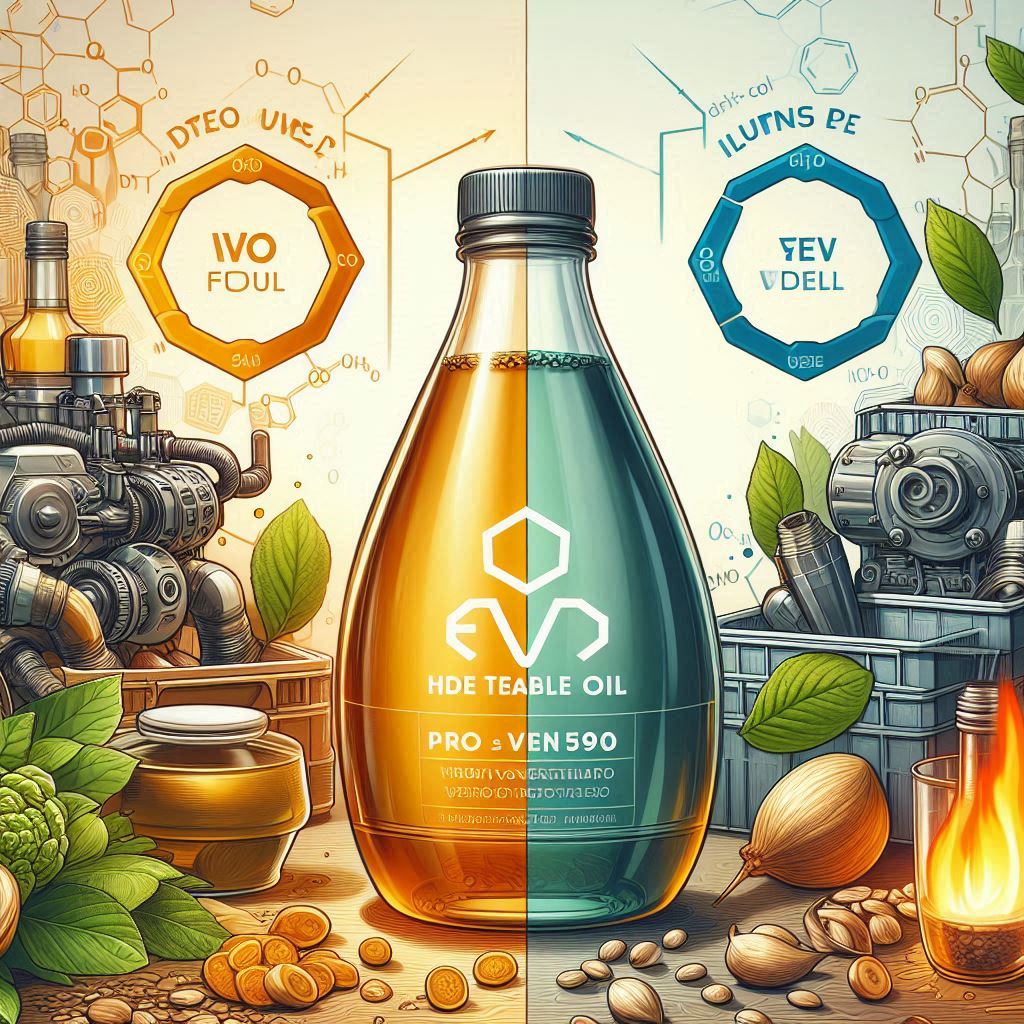
HVO Fuel vs EN590 Diesel: Pros, Cons, and Uses
Short Intro
HVO fuel (Hydrotreated Vegetable Oil) is a renewable alternative to EN590 diesel, offering cleaner combustion, reduced emissions, and compatibility with existing diesel engines. This article explores its pros and cons, how it is made, chemical structure, availability, and use as heating oil.
Introduction
Hydrogenated Vegetable Oil (HVO) fuel has become one of the most promising renewable energy solutions in today’s transportation and heating industries. Produced through advanced hydrotreating technology, HVO is derived from waste vegetable oils and animal fats, making it a sustainable and low-carbon alternative to fossil-based fuels like EN590 diesel. Its ability to reduce greenhouse gas emissions, work seamlessly in existing diesel engines, and offer higher energy efficiency makes it attractive to both industries and households.
However, HVO fuel still faces challenges such as limited availability, higher costs, and feedstock competition. In this article, we will cover the HVO fuel pros and cons, production process, chemical formula, heating oil applications, and where to buy it, while also comparing its role against EN590 diesel, the global benchmark for automotive diesel fuels.
SEO Snippet
Looking for a sustainable alternative to EN590 diesel? HVO fuel offers cleaner combustion, reduced emissions, and compatibility with diesel engines. Learn its pros and cons, how it’s made, chemical formula, heating oil use, and where to buy HVO fuel in your region.
HVO Fuel Pros and Cons
HVO fuel has clear environmental and performance advantages compared to EN590 diesel.
Pros of HVO Fuel
- Renewable & Sustainable: Made from waste fats and oils, reducing reliance on fossil fuels.
- Reduced Emissions: Produces fewer greenhouse gases, sulfur, and particulates than EN590 diesel.
- Engine Compatibility: Works in existing EN590 diesel engines without modifications.
- Higher Energy Content: Offers better mileage and efficiency.
- Cleaner Combustion: Extends engine life with fewer deposits.
Cons of HVO Fuel
- Limited Availability: Not yet as widely available as EN590 diesel.
- Higher Cost: More expensive due to production and limited economies of scale.
- Feedstock Competition: Requires sustainable sourcing to avoid conflict with food production.
How is HVO Fuel Made?
HVO fuel is created through hydrotreating, where vegetable oils or animal fats undergo hydrogenation. This process eliminates oxygen, sulfur, and nitrogen impurities, converting unsaturated fatty acids into saturated hydrocarbons.
Steps:
- Feedstock Preparation – Collecting and refining waste oils or fats.
- Hydrotreating Reaction – Using hydrogen gas with catalysts like nickel or cobalt.
- Hydrogenation – Breaking double bonds in fatty acids to form saturated hydrocarbons.
- Fractionation – Removing impurities and refining hydrocarbon chains.
- Blending – Mixing with additives or EN590 diesel for market-ready use.
The result is a clean-burning diesel alternative that meets or exceeds EN590 diesel performance standards.
HVO Fuel Chemical Formula
The chemical composition of HVO fuel consists mainly of long-chain hydrocarbons (C12–C20) derived from fatty acids.
- Saturated Fatty Acids Formula: CnH2n+1COOH
- General Hydrocarbon Formula: CnH2n+2
Unlike biodiesel (FAME), HVO contains no oxygen, giving it superior stability, storage life, and performance similar to or better than EN590 diesel.
Where to Buy HVO Fuel
HVO is gaining availability globally, though EN590 diesel remains dominant. You can source HVO fuel from:
- Fuel Stations: Limited but growing presence in Europe and the UK.
- Renewable Energy Companies: Specialized providers offering bulk supplies.
- Online Platforms: Renewable energy marketplaces.
- Fuel Distributors & Refineries: Direct supply to fleets, industries, and heating customers.
Companies often provide blends of HVO and EN590 diesel to balance cost and sustainability.
HVO Heating Oil
HVO fuel is also being used as heating oil to replace traditional kerosene or gas oil.
Benefits of HVO Heating Oil:
- Works in existing heating systems without modifications.
- Reduces carbon emissions by up to 90% compared to fossil fuels.
- Improves air quality with cleaner combustion.
Although more expensive than conventional heating oil, it offers a sustainable alternative aligned with net-zero carbon goals.
LSI Keywords
- Renewable diesel fuel
- HVO vs EN590 diesel
- HVO heating oil price
- HVO fuel suppliers UK EU
- Hydrotreated vegetable oil production
- Sustainable fuel alternatives
- Buy HVO diesel online
- Renewable heating oil
External Links
- European Commission – Renewable Energy Directive
- UK Government – Renewable Transport Fuel Obligation
- International Energy Agency – Renewable Fuels
Conclusion
HVO fuel represents a powerful step toward sustainable energy. With lower emissions, compatibility with EN590 diesel infrastructure, and growing use in transport and heating, it bridges the gap between fossil fuels and a renewable future. However, challenges such as cost, scalability, and feedstock sourcing must be addressed. As production expands, HVO could become a mainstream alternative to EN590 diesel, reshaping global energy supply chains.
For businesses and consumers alike, switching to HVO offers immediate environmental benefits without sacrificing performance. While EN590 diesel remains the standard, the gradual adoption of HVO fuel shows how industries can move toward greener energy solutions.
About NovinTrades
At NovinTrades, we specialize in global energy trade, with expertise in EN590 diesel, HVO fuel, bitumen, and other oil products. Our Reportage Section allows businesses to publish in-depth industry articles, enhancing visibility and authority.
Stay updated with our latest insights and market opportunities by joining our Telegram channel: https://t.me/novintrades.
Whether you’re exploring EN590 diesel supplies or renewable alternatives like HVO, NovinTrades is your trusted partner for sustainable energy solutions.

